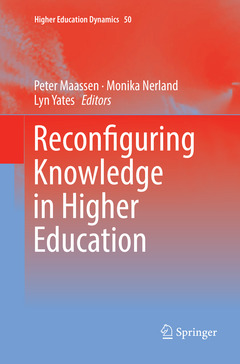Reconfiguring Knowledge in Higher Education, 1st ed. 2018 Higher Education Dynamics Series, Vol. 50
Coordonnateurs : Maassen Peter, Nerland Monika, Yates Lyn

Knowledge is now central to national economic competitiveness and to socio-economic endeavours concerned with inequalities and social exclusion, and in this context higher education is recognized as a core sector of national policy and strategy. Yet the changing pressures, directions and practices in relation to knowledge pose many challenges for higher education itself. How can and how should research and study programs within higher education align with wider knowledge dynamics? How can higher education prepare students in professional fields for different kinds of knowledge-intensive work practices? How can short term economic objectives for higher education be aligned with other kinds of knowledge objectives that have characterized universities and colleges, and with the intensified impact of global rankings? This book takes as its focus the core interest of higher education in knowledge, and takes as its object of inquiry the kinds of reconfiguration of knowledge evident in national policies and governance; and in the redevelopment and practices of a range of professional and academic study programs in higher education institutions in Norway and Australia. From these detailed accounts, the book demonstrates the complexity of knowledge as an object of policy and practice; the competing logics that may be evident within and between study programs and policies; and the different kinds of agents and drivers that are part of knowledge reconfiguration in higher education and that need further attention going forward.
Unpacks ‘knowledge’ as a complex object of national policy, and in institutional practices in higher education
Detailed empirical attention to conceptions and practices of knowledge in HE today
Both ‘top down’ and ‘bottom up’ – that is, enables attention both to the governance reconfigurations and the reconfigurations of practice - and their interactions and slippages
Based on two major national research studies (Norway and Australia) both framed in context of global changes today
Sets up a new kind of agenda for further research on the practices of change in higher education.
Date de parution : 02-2019
Ouvrage de 202 p.
15.5x23.5 cm
Date de parution : 03-2018
Ouvrage de 202 p.
15.5x23.5 cm
Thème de Reconfiguring Knowledge in Higher Education :
Mots-clés :
Knowledge policies and change dynamics in higher education; Steering and coordination problems in the knowledge sector; Disciplinary foundations in an era of grand challenges; Policy trajectories in Norwegian higher education; Mediators of change at the interface of policy and practice; Massive open online courses (MOOCs); Tensions between inward and outward-facing agendas in a MOOC; Reconfiguration of knowledge in educational programmes; Research as instrument for learning in teacher education; Development assignments as instrument for learning; Shifting knowledge practices in physics



